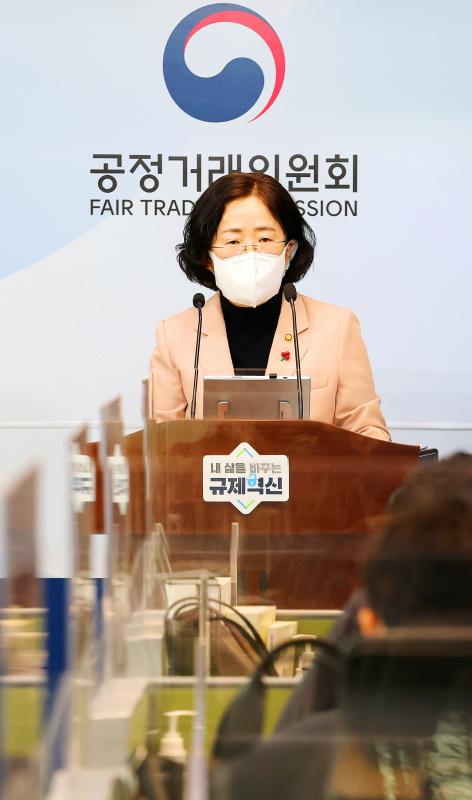South Korea’s antitrust watchdog yesterday fined 23 domestic and foreign shippers a combined 96.2 billion won (US$80.84 million) for price-fixing, including three Taiwanese container shippers — Evergreen Marine Corp (長榮海運), Yang Ming Marine Transport Corp (陽明海運) and Wan Hai Lines Ltd (萬海航運) — the Central News Agency and Japan’s Nikkei Asia reported.
Korea Marine Transport Co and Sinokor Merchant Marine Co instigated the collusion by raising freight rates for routes between South Korea and Southeast Asia, China and Japan, and they were later joined by other foreign and domestic firms, the Korea Fair Trade Commission said, citing the results of an investigation.
From 2003 to 2018, the shippers met 120 times to set costs of container cargo services, the commission said.

Photo: EPA-EFE
The 23 firms hid collective transaction actions that were not allowed under the country’s fair-trade regulations, it said.
Customers who did not accept the freight rates the shippers set were denied service, it said.
The total fines were much lower than the 800 billion won that a review committee recommended and there has been criticism that the sanctions were too light, the media reports said.
Korea Marine Transport faces the largest fine of 29.6 billion won, the commission said.
The fines are subject to an appeal filed with the country’s administrative court.
Yang Ming Marine Transport general manager Tu Shu-chin (杜書勤) expressed surprise at the ruling.
Many shippers are members of the Intra-Asia Discussion Agreement, an institution with a long history, Tu told the Taipei Times by telephone, adding that discussions among its members should not be considered price fixing.
Another manager at one of the three Taiwanese firms said on condition of anonymity that if members of the intra-Asia group were to set shipping rates explicitly, it would be price setting, but “there should be some space for argument.”
“Even though the commission has levied the fines, there is a slim chance that local container shippers will take a hard stance against the regulator, as they still have to continue managing the South Korean market, which has big clients such as LG Corp,” the second manager said.
The three shippers had not received notification from the commission and they would consider legal action, including an appeal, to protect shareholders’ interests, the three firms said in separate filings with the Taiwan Stock Exchange.
The regulator fined Wan Hai Lines 11.51 billion won, Evergreen Marine 3.399 billion won and Yang Ming Marine Transport 2.419 billion won, the media reports said.
The fine should not have a significant impact on its finances, Yang Ming Marine Transport said, adding that it had liaised with lawyers to assist with the case to protect its interests.
Evergreen Marine said that it would clarify the details after receiving a sanction letter from the regulator and would lodge an appeal if necessary to ensure its interests.
Wan Hai Lines said that the fine would not affect its financial standing, but it would discuss with lawyers how to proceed with the case.
Additional reporting by CNA

Among the rows of vibrators, rubber torsos and leather harnesses at a Chinese sex toys exhibition in Shanghai this weekend, the beginnings of an artificial intelligence (AI)-driven shift in the industry quietly pulsed. China manufactures about 70 percent of the world’s sex toys, most of it the “hardware” on display at the fair — whether that be technicolor tentacled dildos or hyper-realistic personalized silicone dolls. Yet smart toys have been rising in popularity for some time. Many major European and US brands already offer tech-enhanced products that can enable long-distance love, monitor well-being and even bring people one step closer to

Malaysia’s leader yesterday announced plans to build a massive semiconductor design park, aiming to boost the Southeast Asian nation’s role in the global chip industry. A prominent player in the semiconductor industry for decades, Malaysia accounts for an estimated 13 percent of global back-end manufacturing, according to German tech giant Bosch. Now it wants to go beyond production and emerge as a chip design powerhouse too, Malaysian Prime Minister Anwar Ibrahim said. “I am pleased to announce the largest IC (integrated circuit) Design Park in Southeast Asia, that will house world-class anchor tenants and collaborate with global companies such as Arm [Holdings PLC],”

TRANSFORMATION: Taiwan is now home to the largest Google hardware research and development center outside of the US, thanks to the nation’s economic policies President Tsai Ing-wen (蔡英文) yesterday attended an event marking the opening of Google’s second hardware research and development (R&D) office in Taiwan, which was held at New Taipei City’s Banciao District (板橋). This signals Taiwan’s transformation into the world’s largest Google hardware research and development center outside of the US, validating the nation’s economic policy in the past eight years, she said. The “five plus two” innovative industries policy, “six core strategic industries” initiative and infrastructure projects have grown the national industry and established resilient supply chains that withstood the COVID-19 pandemic, Tsai said. Taiwan has improved investment conditions of the domestic economy

Sales in the retail, and food and beverage sectors last month continued to rise, increasing 0.7 percent and 13.6 percent respectively from a year earlier, setting record highs for the month of March, the Ministry of Economic Affairs said yesterday. Sales in the wholesale sector also grew last month by 4.6 annually, mainly due to the business opportunities for emerging applications related to artificial intelligence (AI) and high-performance computing technologies, the ministry said in a report. The ministry forecast that retail, and food and beverage sales this month would retain their growth momentum as the former would benefit from Tomb Sweeping Day